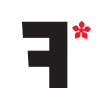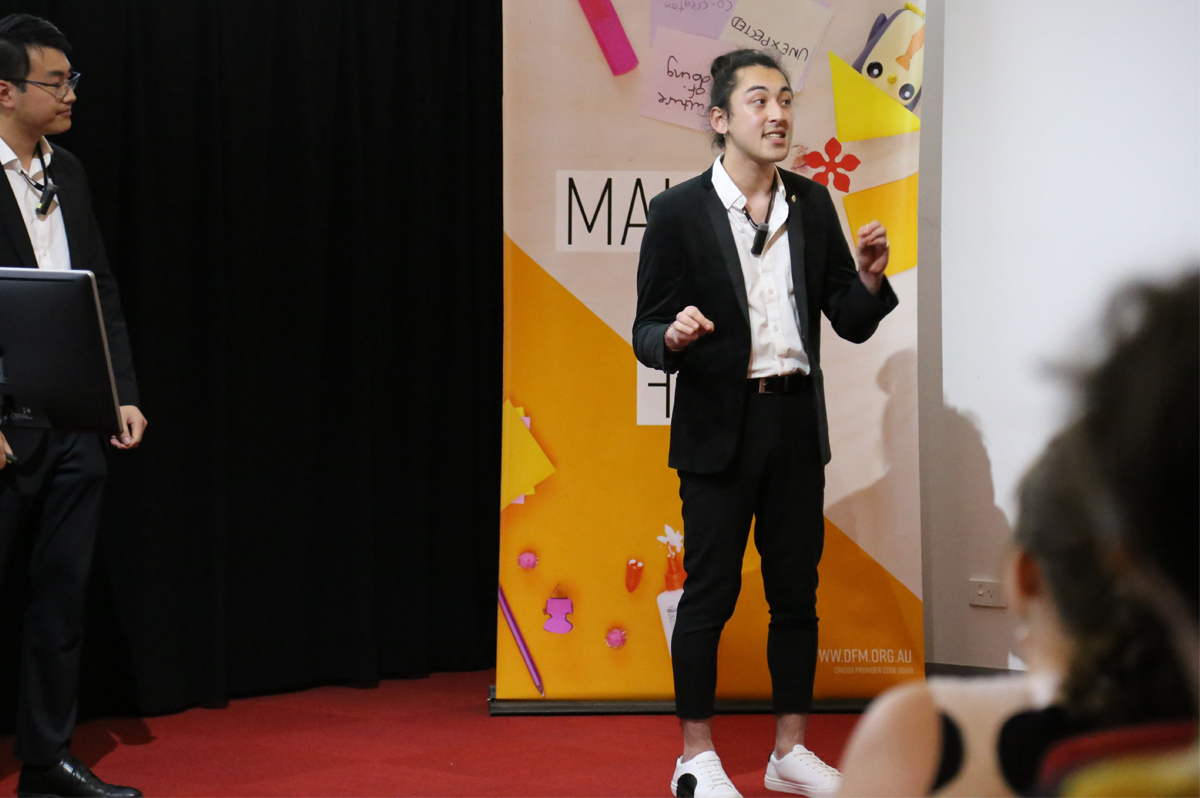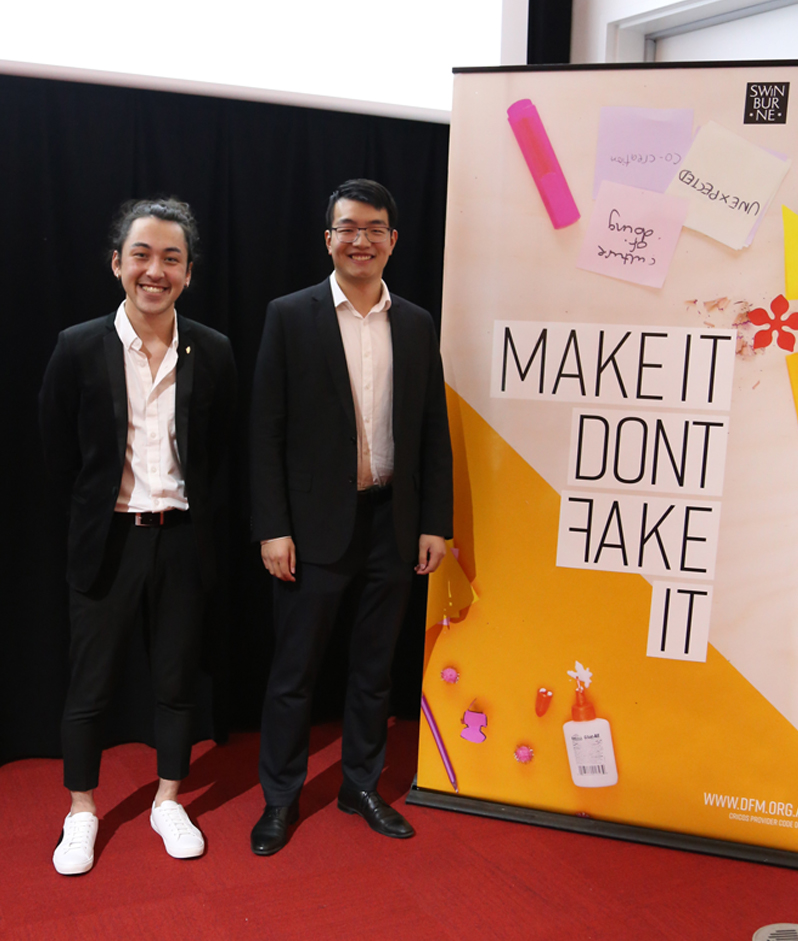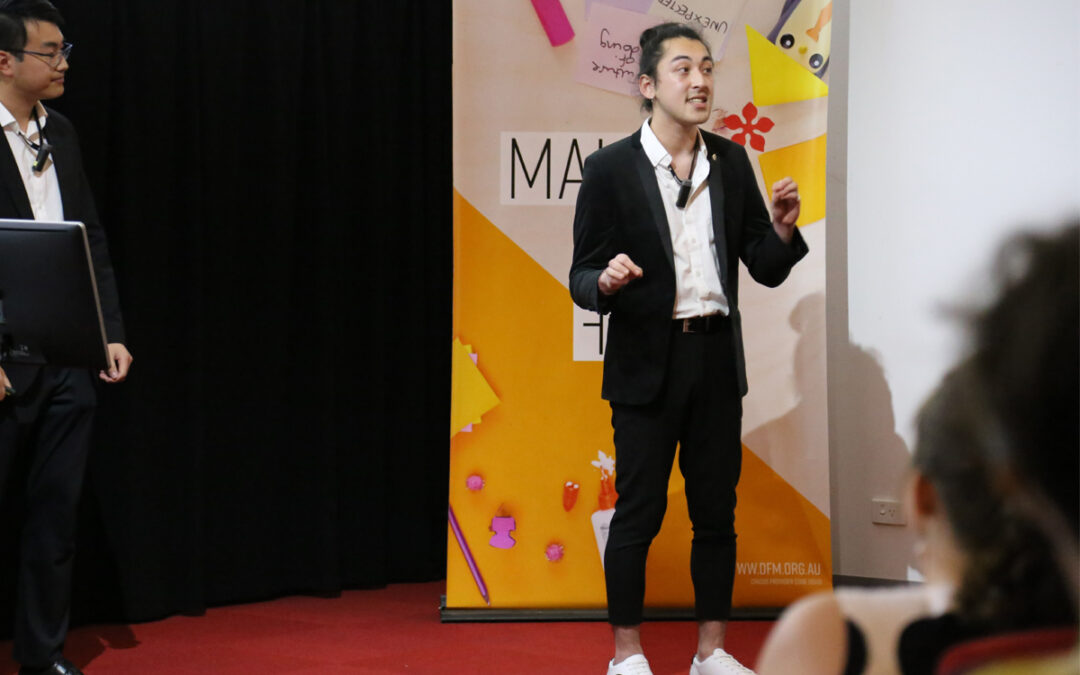Alumni
Chatting with DFM Alumni: Jaiden Gusti

11 August 2020
Communication Design student Jaiden Gusti immersed himself in DFM’s vibrant community during his Honours year. Read about his experience below.
Can you describe Design Factory Melbourne in three words? Engaging, exciting, collaborative. It’s kind of hard to put it all together in just three words – it’s a truly wild experience!
What sort of projects did you work on at DFM? The classes I did with DFM were the Toolbox class and the Innovation Challenge.
The Toolbox was my introduction to interdisciplinary work – it was the first time in my Bachelors Degree that I got to do that. We built catapults and then machines to load the catapults. It was a great way to really get you engaged, as well as getting you involved with group work which requires you to work with people from different backgrounds.
The Innovation Challenge was another awesome opportunity to get to work with big industrial partners – in my case Mondelez. I got to work with an interdisciplinary group on the brief and develop something worthwhile. We conducted lots of primary and secondary research, so it felt as if we were developing something compelling which had a place in the market. Overall, it’s been a great experience as it taught me to work with people from different backgrounds and apply design in a non-traditional way.

Would you say that’s the point of difference between DFM and a traditional university class? Yeah, I would say that. I think it’s the thing I love most about DFM – just the experience of it. It’s the way the students are really getting involved with one another. It’s the way we’re able to work with industry partners. It’s the way we’re being taught.
“There are so many different ways of learning, and I see DFM as a space to grow. It’s where everything can be pulled together and not only help you to develop your design skills, but also develop as a person.”
What is your favourite DFM memory? Probably the prototyping room – there are so many great experiences in there. It’s nice to get hands on and really work with people. Also, getting the chance to present my work to industry partners as the DFM Showcase. There are so many opportunities which come with that.
What skills did DFM teach you? What was your biggest learning experience? Definitely my interpersonal skills, as in the way I work with people. It’s really taught me a lot about group work. In my Communication Design degree, you’re working with people from the same background. And so coming into DFM, you’ve really got to observe how people understand design, and how everyone is involved in the design process.
What did you find the most challenging about your time with DFM? Probably the same thing. With interpersonal skills, I find I’m not always the most confident person. And so in those first couple of units, especially the Toolbox, when I was coming from a communication design background and had to work with people from business or entrepreneurial backgrounds, I found there was a learning curve to kind of strip away my ego. I had to let that go and be on the same level as those from non-design backgrounds. It’s a very human centred way of design, and it made me realise that design thinking is something that should be available to everyone.

So even though it was a challenge, you got lots of value out if it? Yeah – I think there’s a lot of empathy involved with human centred design. When you work with different people, you understand how they work and how they bring in their knowledge from their own discipline. I got to see how it all worked together with design and my own discipline. It was a bit of a steep learning curve, but it’s a skill that once you learn, you take so much away from it.
Where has DFM taken you? After finishing my minor and Bachelors, I did an internship with Wilderness Society. That has led me to doing more interdisciplinary group work.
Also, after initially completing the minor, it led me to rethink what exactly I wanted to do. I decided to apply for the Bachelor of Design Honours and do the DFM local stream, and so I’m currently in the middle of that now with one more semester to go.
What will you miss about DFM when you’re done? Not only just the people, but the space as well. I think DFM as a whole has such a great community around it. So many people are involved in making the space amazing for everyone who comes in.
“Whether you’re just doing it for one semester or the whole minor, it’s such a welcoming and open space to explore design and design thinking.”
What do you think you’ll take away from DFM into your next career? I’ve definitely learned heaps about design and design thinking, as well as its applications. I think its broadened my career path, because originally I was very focused on doing communication design, but DFM has opened me up to service design and systems design. There are so many opportunities that I have now from being a part of DFM, and I think I really want to test the experience as much as I can.
What is your key take-away from DFM? DFM is multifaceted, it’s experiential, and it’s something that you don’t get to experience much at university.
DFM is such an experience in itself – it’s not only very hands on, but you get to go in depth with whatever brief you’re given. It’s taught me a lot.
Sound good? If you are interested in having a Design Factory experience as part of your degree – check out your study options here or email us to chat to the team.

